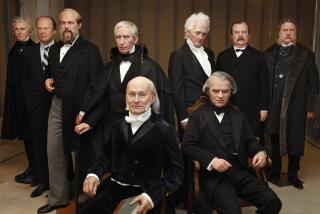Wrong Job Description
- Share via
Warren Bennis’ Viewpoints column (“Presidents as CEOs,” March 6) was witty and in large part persuasive. I think most would agree that he made many fine and telling criticisms of the current crop of presidential candidates. But Bennis also seems to want to make a more serious and questionable claim--that successful presidents “should also have what it takes to succeed in the executive suite: leadership skill.” Such a declaration seems unassailable on its face. But one might differ with its implications.
The business world is not the political world. Beyond the domain of compromise, negotiation, point-and-counterpoint--the very means of politics--there lies the arena of ideology, world view and constituency. The most successful political leaders in this country have been those men and women who could articulate a view of the world that not only made sense to themselves, but that also made sense to, and even captivated, others. The great leaders of the political world are those who can link the means of political deal making with the ideological base of a powerful, voting constituency. Unfortunately, in Bennis’ scheme of evaluation, the problem of the substance of politics seems altogether ignored.
A fine chief executive is not necessarily a good president, and the converse is also undeniably true. It strains the imagination to think of Abraham Lincoln at the helm of a corporate enterprise. Can we conceive of him returning to Illinois, had he lived, to run a business?
And yet his sense of presidential leadership was, of course, marvelously acute. In fact, it is striking to consider that if one had applied Bennis’ bill of particulars to Franklin Roosevelt in the 1932 campaign--a campaign in which Roosevelt was notable for his reticence, evasion of direct questions and lack of a coherent program to fight the economic emergency--the conclusion would have been simple: Roosevelt lacked what it would take to succeed as president. And that conclusion, to be sure, would have been stunningly wrong.
MICHAEL A. BERNSTEIN
La Jolla
The writer is an assistant professor of history at the University of California, San Diego.
More to Read
Get the L.A. Times Politics newsletter
Deeply reported insights into legislation, politics and policy from Sacramento, Washington and beyond. In your inbox twice per week.
You may occasionally receive promotional content from the Los Angeles Times.










